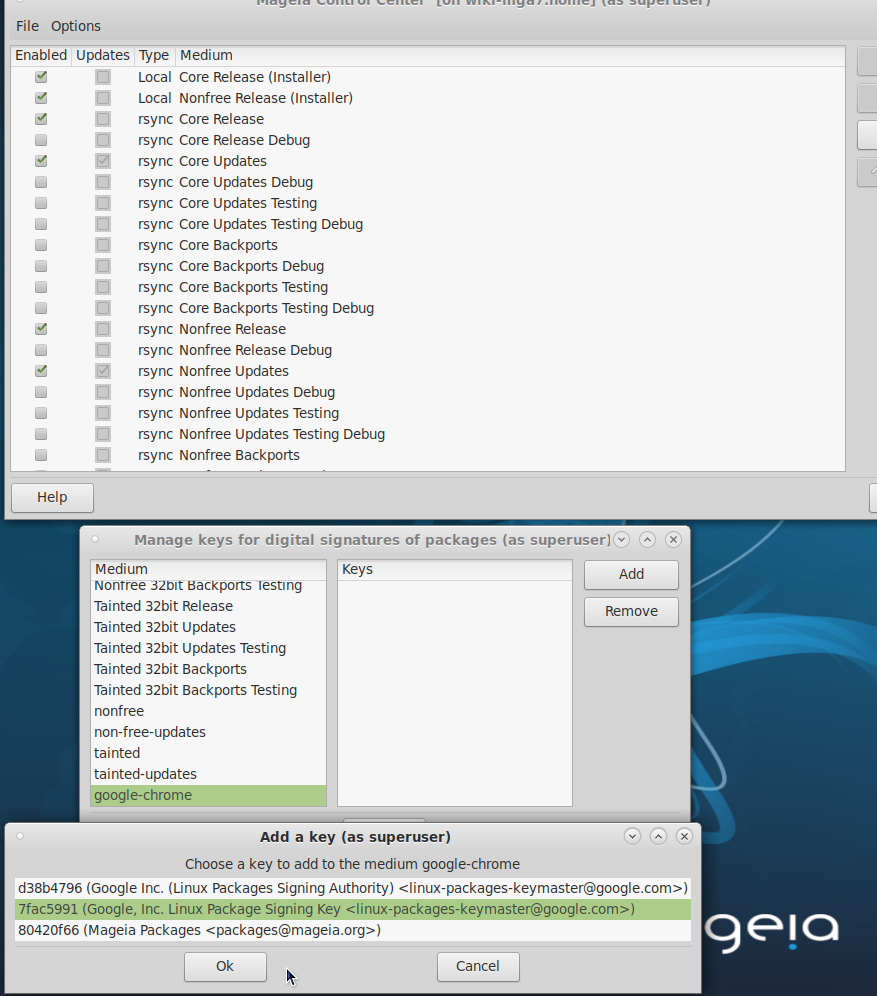Contents
Introduction
Chrome is a cross-platform web browser developed by Google. This page describes how to install Google Chrome in Mageia Linux.
Google now only provides google-chrome-stable for 64 bit Linux systems.
Also shown here, how to:
- configure the Google URPMI repository in Mageia
- download and import Google's Linux Package signing key
Benefits
- google-chrome-stable has some features that are not available in chromium-browser (which is available as a package to install in Mageia).
- It is more secure to verify the install image from Google with Google's Linux signing key.
The differences between chromium-bowser and google-chrome-stable are summarized in Wikipedia.
Preparation
Verify using 64 bit system
Google chrome is no longer available for 32bit Linux systems.
Check:
[ "x86_64" = $(uname -m) ] && echo 64 bit: Google-chrome-stable is available || echo not 64 bit: Google-chrome-stable not available
Example:
[user@localhost ~]$ [ "x86_64" = $(uname -m) ] && echo 64 bit: Google-chrome-stable is available || echo not 64 bit: Google-chrome-stable not available 64 bit: Google-chrome-stable is available
Add Google's URPMI source for google-chrome-stable
Adding Google's URPMI source for google-chrome-stable will enable any pending updates to be automatically fetched and installed when Mageia is updated (eg with: urpmi --auto-update ).
urpmi.addmedia --update google-chrome http://dl.google.com/linux/chrome/rpm/stable/x86_64/
Example:
[root@localhost ~]# urpmi.addmedia --update google-chrome http://dl.google.com/linux/chrome/rpm/stable/x86_64/
adding medium "google-chrome"
http://dl.google.com/linux/chrome/rpm/stable/x86_64/media_info/synthesis.hdlist.cz
Add key for Google's Linux rpms
d=~/Downloads/Google_Linux_key
mkdir -p ${d} 2> /dev/null
cd ${d}
wget https://dl.google.com/linux/linux_signing_key.pub #download Google's key
/bin/sudo rpm --import linux_signing_key.pub #import the key
Example:
[user@localhost ~]$ d="~/Downloads/Google_Linux_key"
[user@localhost ~]$ mkdir -p ${d} 2> /dev/null
[user@localhost ~]$ cd ${d}
[user@localhost Google_Linux_key]$ wget https://dl.google.com/linux/linux_signing_key.pub #download Google's key
--2020-02-15 17:11:14-- https://dl.google.com/linux/linux_signing_key.pub
Resolving dl.google.com (dl.google.com)... 172.217.169.78, 2a00:1450:4009:819::200e
Connecting to dl.google.com (dl.google.com)|172.217.169.78|:443... connected.
HTTP request sent, awaiting response... 200 OK
Length: 10218 (10.0K) [application/octet-stream]
Saving to: ‘linux_signing_key.pub’
linux_signing_key.pub 100%[===================================================================================>] 9.98K --.-KB/s in 0.002s
2020-02-15 17:11:14 (5.10 MB/s) - ‘linux_signing_key.pub’ saved [10218/10218]
[user@localhost Google_Linux_key]$ /bin/sudo rpm --import linux_signing_key.pub #import the key
[sudo] password for user:
Verify key
rpm -qi gpg-pubkey-7fac5991-*
Example:
[user@localhost Google_Linux_key]$ rpm -qi gpg-pubkey-7fac5991-* #Verify key installation Name : gpg-pubkey Version : 7fac5991 Release : 4615767f Architecture: (none) Install Date: Sat 11 Jan 2020 00:51:01 GMT Group : Public Keys Size : 0 License : pubkey Signature : (none) Source RPM : (none) Build Date : Thu 05 Apr 2007 23:21:51 BST Build Host : localhost Relocations : (not relocatable) Packager : Google, Inc. Linux Package Signing Key <linux-packages-keymaster@google.com> Summary : gpg(Google, Inc. Linux Package Signing Key <linux-packages-keymaster@google.com>) Description : -----BEGIN PGP PUBLIC KEY BLOCK----- Version: rpm-4.14.2.1 (NSS-3) mQGiBEXwb0YRBADQva2NLpYXxgjNkbuP0LnPoEXruGmvi3XMIxjEUFuGNCP4Rj/a kv2E5VixBP1vcQFDRJ+p1puh8NU0XERlhpyZrVMzzS/RdWdyXf7E5S8oqNXsoD1z fvmI+i9b2EhHAA19Kgw7ifV8vMa4tkwslEmcTiwiw8lyUl28Wh4Et8SxzwCggDcA feGqtn3PP5YAdD0km4S4XeMEAJjlrqPoPv2Gf//tfznY2UyS9PUqFCPLHgFLe80u QhI2U5jt6jUKN4fHauvR6z3seSAsh1YyzyZCKxJFEKXCCqnrFSoh4WSJsbFNc4PN b0V0SqiTCkWADZyLT5wll8sWuQ5ylTf3z1ENoHf+G3um3/wk/+xmEHvj9HCTBEXP 78X0A/0Tqlhc2RBnEf+AqxWvM8sk8LzJI/XGjwBvKfXe+l3rnSR2kEAvGzj5Sg0X 4XmfTg4Jl8BNjWyvm2Wmjfet41LPmYJKsux3g0b8yzQxeOA4pQKKAU3Z4+rgzGmf HdwCG5MNT2A5XxD/eDd+L4fRx0HbFkIQoAi1J3YWQSiTk15fw7RMR29vZ2xlLCBJ bmMuIExpbnV4IFBhY2thZ2UgU2lnbmluZyBLZXkgPGxpbnV4LXBhY2thZ2VzLWtl eW1hc3RlckMBnb29nbGUuY29tPohjBBMRAgAjAhsDBgsJCAcDAgQVAggDBBYCAwEC HgECF4AFAkYVdn8CGQEACgkQoECDD3+sWZHKSgCfdq3HtNYJLv+XZleb6HN4zOcF AJEAniSFbuv8V5FSHxeRimHx25671az+uQINBEXwb0sQCACuA8HT2nr+FM5y/kzI A51ZcC46KFtIDgjQJ31Q3OrkYP8LbxOpKMRIzvOZrsjOlFmDVqitiVc7qj3lYp6U rgNVaFv6Qu4bo2/ctjNHDDBdv6nufmusJUWq/9TwieepM/cwnXd+HMxu1XBKRVk9 XyAZ9SvfcW4EtxVgysI+XlptKFa5JCqFM3qJllVohMmr7lMwO8+sxTWTXqxsptJo pZeKz+UBEEqPyw7CUIVYGC9ENEtIMFvAvPqnhj1GS96REMpry+5s9WKuLEaclWpd K3krttbDlY1NaeQUCRvBYZ8iAG9YSLHUHMTuI2oea07Rh4dtIAqPwAX8xn36JAYG 2vgLAAMFB/wKqaycjWAZwIe98Yt0qHsdkpmIbarD9fGiA6kfkK/UxjL/k7tmS4Vm CljrrDZkPSQ/19mpdRcGXtb0NI9+nyM5trweTvtPw+HPkDiJlTaiCcx+izg79Fj9 KcofuNb3lPdXZb9tzf5oDnmm/B+4vkeTuEZJ//IFty8cmvCpzvY+DAz1Vo9rA+Zn cpWY1n6z6oSS9AsyT/IFlWWBZZ17SpMHu+h4Bxy62+AbPHKGSujEGQhWq8ZRoJAT G0KSObnmZ7FwFWu1e9XFoUCt0bSjiJWTIyaObMrWu/LvJ3e9I87HseSJStfw6fki 5og9qFEkMrIrBCp3QGuQWBq/rTdMuwNFiEkEGBECAAkFAkXwb0sCGwwACgkQoECD D3+sWZF/WACfeNAu1/1hwZtUo1bR+MWiCjpvHtwAnA1R3IHqFLQ2X3xJ40XPuAyY /FJG =Quqp -----END PGP PUBLIC KEY BLOCK-----
Add Google key to Mageia install configuration
Start Mageia Control Center

|
| ^ click on: Configure media sources for install and update |
In Configure media sources click on Options and select Manage keys

|
| ^ click on Options and select Manage keys |
Manage keys: scroll down to google chrome and click add
Install google-chrome-stable
urpmi google-chrome-stable
Example:
[user@localhost Google_Linux_key]$ /bin/sudo urpmi google-chrome-stable
[sudo] password for user:
http://dl.google.com/linux/chrome/rpm/stable/x86_64/google-chrome-stable-80.0.3987.122-1.x86_64.rpm
installing google-chrome-stable-80.0.3987.122-1.x86_64.rpm from /var/cache/urpmi/rpms
Preparing... #############################################################################################################
1/1: google-chrome-stable #############################################################################################################
Redirecting to /bin/systemctl start atd.service
Run google-chrome-stable
From the command line:
/usr/bin/google-chrome-stable
From the MATE control panel:
Applications => Internet => More => Google Chrome
Appendix-1: References and links
| # | comment | link |
|---|---|---|
| 1 | Google's notes about Linux Software Repositories (with keys detail) | https://www.google.com/linuxrepositories/ |
| 2 | Differences between chromium-bowser and google-chrome-stable | https://en.wikipedia.org/wiki/Chromium_(web_browser)#Differences_from_Google_Chrome |
| 3 | Most asked questions about Chromium and Chrome in Mageia Forums | https://forums.mageia.org/en/viewtopic.php?f=36&t=2053&p=15047&hilit=Chrome+questions#p15047 |
Appendix-2: What happens without Google's signing key?
It is still possible to install google-chrome-stable but the install image is not verified using the key.
It is more secure to verify the install image with Google's key.
Without the key, an install (or update) would typically pause the install and prompt for a Y/N response and display a warning message like:
The following package has bad signature: /var/cache/urpmi/rpms/google-chrome-stable-80.0.3987.106-1.x86_64.rpm: Medium without key (OK (DSA/SHA1, Thu 13 Feb 2020 04:32:35 GMT, Key ID a040830f7fac5991)) Do you want to continue installation ? (y/N)
